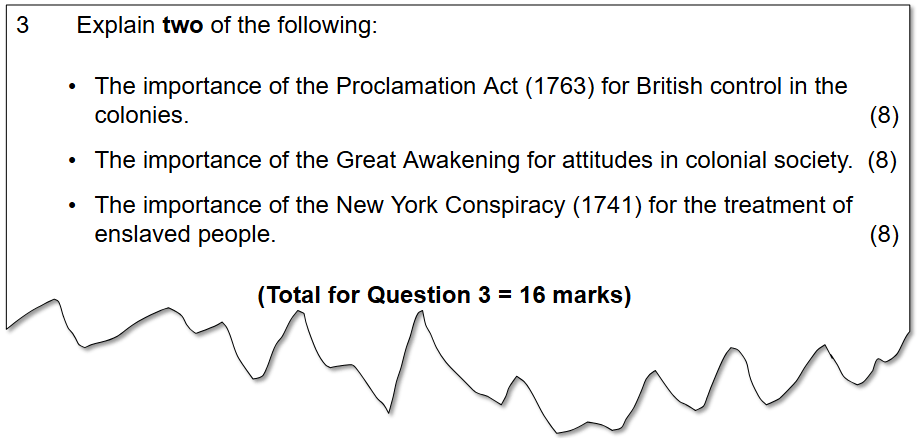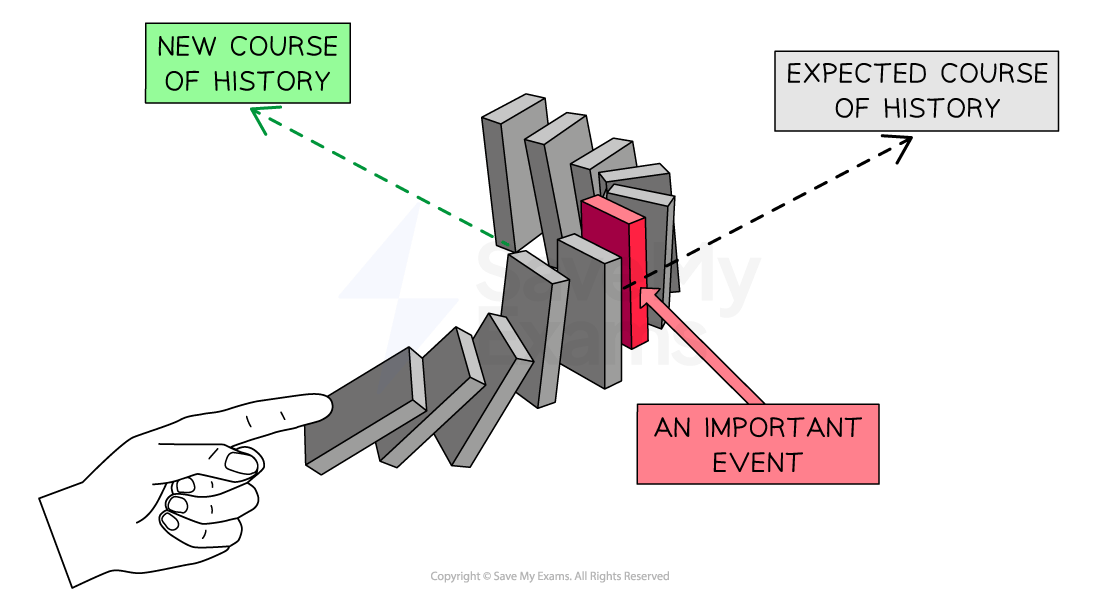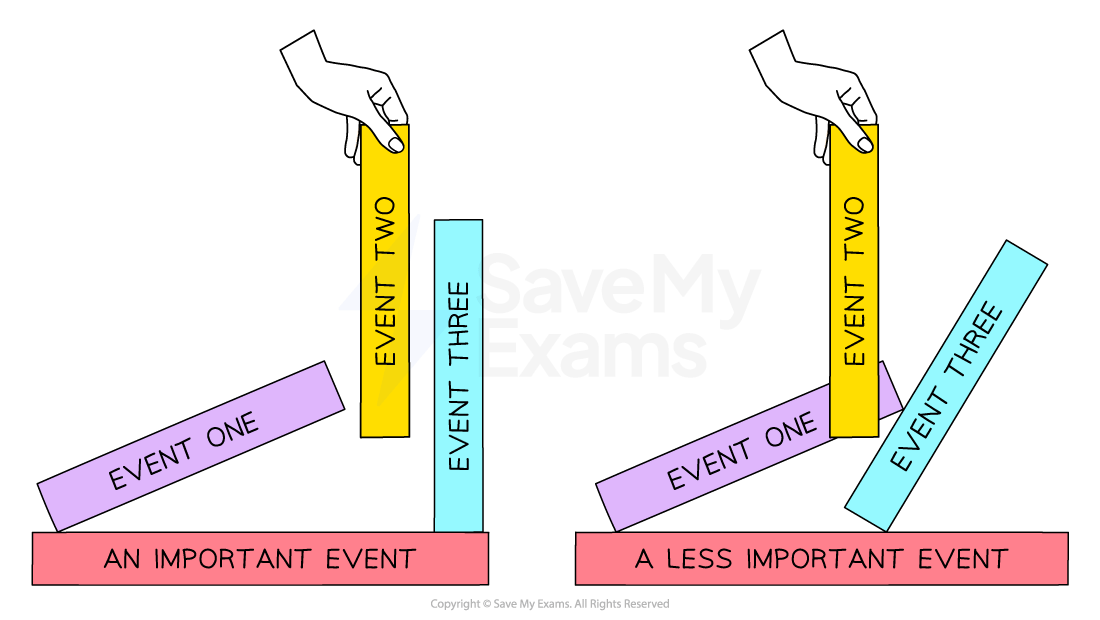The 16 Mark "Explain the Importance of " Question (Edexcel GCSE History): Revision Note
Exam code: 1HI0
Summary of Question 3
Question 3 requires you to explain why a particular event was important for a key theme, such as British–American relations
You will be given three options
You must answer two
Each option is worth 8 marks
This question will require you to use second-order concepts in your answer
Amount of marks | 16 (2×8 marks) |
|---|---|
The time that you should spend on the question | No more than 25 minutes |
An example of the type of question you may encounter can be seen below:

In previous years, this question has focused on the following topics in British America, 1713–83:
Year of exam | Question topic |
|---|---|
2018 (opens in a new tab) | Option one: Slavery for the development of plantations Option two: The Enlightenment for cultural development in British America Option three: The Stamp Act (1765) for relations between Britain and America |
2019 (opens in a new tab) | Option one: King George’s War (1744–48) for relations with Native Americans Option two: The Treaty of Paris (1763) for the colonists in British America Option three: Thomas Paine’s "Common Sense" for the Declaration of Independence |
2020 (opens in a new tab) | Option one: Trade with Britain for the economic development of colonial society, 1713–41 Option two: Spain’s protection of runaway slaves for slavery in North America Option three: French and Spanish involvement for the American success in the War of Independence |
2021 | No paper available |
2022 (opens in a new tab) | Option one: Piracy for British trade in North America Option two: Benjamin Franklin for cultural development in the colonies Option three: The Declaration of Independence for slavery |
2023 (opens in a new tab) | Option one: Immigration for the development of colonial society Option two: The "Atlantic trade triangle" for the colonial economy Option three: The Sugar Act (1764) for North American colonists’ relations with Britain |
2024 | Option one: The French and Indian War (1754–63) for British-American relations Option two: Pontiac’s Rebellion (1763–64) for relations with the Native Americans Option three: The Declaration of Independence (1776) for the revolution in the American colonies |
How to explain importance
Importance is a key second-order concept in history
Second-order concepts allow you to:
Understand history
Have a complex explanation
Historical importance is often subjective
Each historian brings their own opinion on what events or people are important
Importance is decided using hindsight. An event is considered important if it:
Created new ideas
Directly changed events at the time
Affected large groups of people
Impacted key themes of the time period, such as:
British–American relations
British control
Had important long-term impacts that can be seen today
To understand importance, visualise a set of falling dominoes
An important event, development or person changes the direction of all of the dominoes that come after it

Imagine the set of dominoes again
If an important development, event or person is taken out of the sequence, other dominoes are stopped from falling
If it is a less important event, it does not stop the dominoes from falling

How to answer an "Explain the importance of" question
You must only select two of the three options
If you answer one of the questions, you will only be able to achieve a maximum of 8 marks
Choose the two options where you can:
Recall accurate, specific knowledge
Explain why that event mattered for the theme
Give two developed points per answer
Examples of themes for the question are:
Relations between different groups
British colonists and Indigenous peoples
Slaveholders and enslaved people
Patriots and Loyalists
Colonists and British authorities
Ways of life in British America
How did cultural, religious and economic factors influence the daily life of colonists or Indigenous peoples?
Slavery
What was the role, impact and consequence of slavery within colonial society and the economy?
British power
Did the event increase, maintain or decrease British authority over the colonies?
If you do not explain the importance of the event to the key theme in the question, you will be limited to 2 marks for each option that you answer
"Explain the importance of" question structure
Your answer should include:
Specific relevant knowledge
Complex explanations showing:
How the event impacted the key theme in the question
How important the event was in the development of British America
Your answers could be written in PEE paragraphs:
P — Make a point about the question
E — Include evidence to support the point you have made (K)
Focus on the event mentioned in the question
E — Explain the question (SOC)
Focus on the key theme of the question
Include a complex explanation showing your understanding of the importance
To achieve full marks for one option, you should aim to write two paragraphs
4 marks for each question are awarded for knowledge (K)
4 marks for each question are awarded for your analysis of second-order concepts, consequences and significance (SOC)
Be sure to:
Put a cross in the box next to your chosen option
Answer in the correct space on the paper
Only answer two options
You will not have time to answer all three options, and you will not get any extra marks for doing so

Worked example of an "Explain the importance of" question
Worked Example
Explain two of the following:
The importance of the Proclamation Act (1763) for British control in the colonies. (8)
The importance of the Great Awakening for attitudes in colonial society. (8)
The importance of the New York Conspiracy (1741) for the treatment of enslaved people. (8)
(Total for Question 3 = 16 marks)
Answer:
Indicate your FIRST choice on this page.
Indicate which question you are answering by marking a cross in the box. If you change your mind, put a line through the box and then indicate your new question with a cross.

The Proclamation Act (1763) was important because it was designed to protect Indigenous lands from English expansion in America (SOC). After the French and Indian War, the British gained control of large amounts of territory in North America. To prevent further conflict, particularly following Pontiac’s Rebellion, the British government banned white settlers from moving west of the Appalachian Mountains (K). This was important for relations with Indigenous peoples because it attempted to reduce tensions. It recognised their rights to certain lands and showed a level of respect and negotiation (SOC).
However, the Act caused resentment from colonists who wanted to settle in the new territories they had helped to win in the war (SOC). Many settlers ignored the boundary and moved west anyway. By 1771, there were around 10,000 settlers in the Ohio Country (K). This made the Act important in worsening long-term relations between Indigenous peoples, who saw both American and English colonists as untrustworthy and hostile, especially through their unfair trading practices and settlement (SOC).
Indicate your SECOND choice on this page.
Indicate which question you are answering by marking a cross in the box. If you change your mind, put a line through the box and then indicate your new question with a cross.

The Great Awakening was important because it divided colonial society (SOC). Many of the people who supported the revivalist preachers were from poorer backgrounds, such as small farmers, workers and enslaved people. These groups liked the message that anyone could have a personal relationship with God. However, many wealthy colonists, landowners and political leaders were against the movement. They preferred the old, traditional churches, where religion was more formal and controlled (K). This was important because it caused conflict between social groups and changed how people viewed religion and power in the colonies. This would later encourage demands for social change (SOC).
The Great Awakening was also important because it helped spread Christianity to people who had been left out before (SOC). Revivalist preachers made an effort to convert enslaved Africans and Indigenous groups such as the Narragansett tribe in Rhode Island. These groups were often not welcomed in traditional churches, but revivalists encouraged them to attend meetings and become Christians (K). This was important because it helped spread Christianity more widely in groups that had previously resisted or been hard to convert. This created a more shared religious identity in the colonies (SOC).

Unlock more, it's free!
Was this revision note helpful?